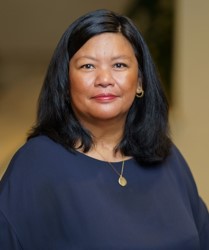Migrant women have been especially harmed by the global systems of oppression that inflict harm upon and withhold power and resources from people who seek to stay, move freely, work, transform, and thrive.
Immigrant justice and gender justice are inherently related: both embrace a world in which everyone can thrive – regardless of how one’s gender identity, sexuality, and/or immigration status converge. Gender identity, sexual identity, and gender norms impact every aspect of migration, including the decision and ability to migrate (e.g., gender norms can dictate who stays and who goes) and the migration journey itself (e.g., gendered risks for violence while in transit, or mis-gendering in detention).
Gender also shapes the arrival experience in the destination country. For example, migrant women are often in the lowest-paid and most precarious jobs – informal jobs mean they lack protection under national labor laws, leaving them vulnerable to abuses. The intersecting systems of sexism, racial capitalism, and classism – as well as the international forces driving displacement and exploitation like imperialism and militarism – have created barriers for migrant women to achieve, among other things, individual and collective economic well-being, including the capacity to attain and build wealth. In addition, the socioeconomic value of work that has traditionally been conducted or predominated by women (for example care work) has been historically underestimated and invisibilized. As a result, BIPOC women – including immigrant, migrant, and refugee women – have suffered disproportionate economic injustice and inequity.
GCIR believes that philanthropy can play a significant role in creating the conditions for migrant women to increase their economic power. With support from Pivotal Ventures, GCIR launched work in early 2022 focused on designing and implementing funder education, strategic communications, and internal learning opportunities to build migrant women’s economic and worker power. Among other things, we:
- hosted webinars exploring entrepreneurial strategies and labor union efforts to improve economic opportunity for migrant women and organizing efforts to strengthen migrant and worker power in rural areas.
- platformed leaders like Mily Treviño-Sauceda of Alianza Nacional de Campesinas, who shared how the work of farmworker women intersects with fights for migrant, gender, worker, and climate justice, and Magaly Urdiales of the Western North Carolina Workers’ Center, who shared her insights on organizing workers in her region as well as the important role philanthropy can play in building migrant worker power and leadership in rural areas.
- convened a cross-functional staff workgroup responsible for brainstorming and designing possible strategies and activities that GCIR will implement to support and advance migrant women’s economic and worker power.
Ultimately, we aim to:
- build migrant women’s economic and worker power to promote self-determination and worker solidarity; facilitate community agency over resources; and build wealth and power.
- leverage and amplify the strengths (such as multiple-culture competency, resourcefulness, collectivism, multilingual skills) of migrant women to create and expand their economic power.
- facilitate solidarity among diverse groups of migrant women workers.
- address and remove the barriers specific to migrant women that impede their ability to build sustainable economic power, including:
- gender-based violence.
- trauma of displacement.
- trauma of family separation.
- burden of being the sole provider for families.
- discrimination in origin countries that reduced educational opportunities and skills training.
- language discrimination.
- social segregation, specifically limited social connections and power.
- lack of access to market-relevant skills, credentials, and work-based learning opportunities for thriving-wage professions.
Who Is Centered in This Work?
Migrant women, with a focus on those who have been disproportionately impacted by the wealth and wage gaps, are centered in this work. We will prioritize:
- Black, Brown and Indigenous migrants.
- migrant women populations that have the lowest earnings.
- women working in industries and occupations where migrant women are disproportionately represented.
As always, we will do this work in a networked way, deepening our partnerships – and developing new ones – with organizations working at the intersections of, among other things, racial justice, gender justice and immigrant justice, groups like Upwardly Global, Collective Futures Fund, Grantmakers for Girls of Color, Justice for Migrant Women, and Tahirih Justice Center.
Looking ahead, we will:
- support narrative work, strategic communications, and research that promotes migrant women’s economic and worker power.
- design political education and strategic opportunities for philanthropy to deliver more resources to migrant workers in the U.S. (especially in historically under-resourced regions) and transnationally.
- apply a gender justice analysis to our internal operations and ensure that GCIR’s operational policies support labor practices aligned with our external efforts to promote women’s economic and worker power.
Gender justice in the context of migration work means dismantling oppressive systems and norms to create conditions in which everyone can access bodily autonomy, economic opportunities, health and safety, full civic participation, and the freedom to move and to stay.
As migrant justice and gender justice practitioners, we understand that our fight for liberation and equality is not separate from, but rather must move in solidarity with, other struggles, such as workers’ rights, racial justice, and climate justice. If you are interested in learning more about and engaging in this work, please reach out to me or to Ivy Suriyopas, GCIR's Vice President of Programs.
Onward,
Marissa
